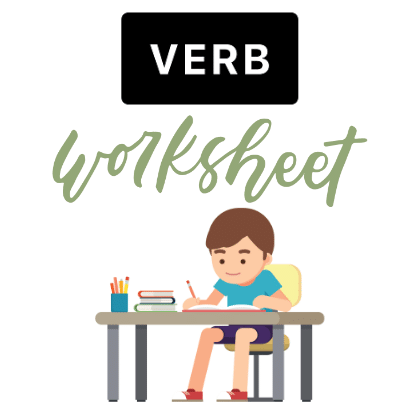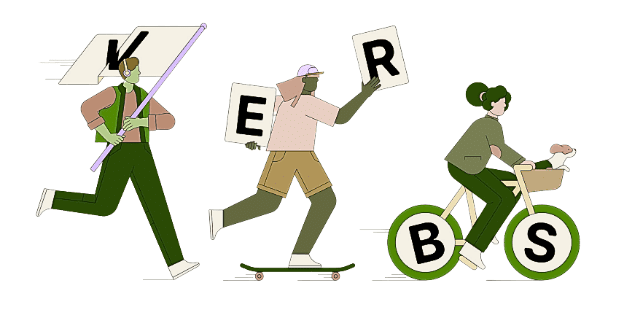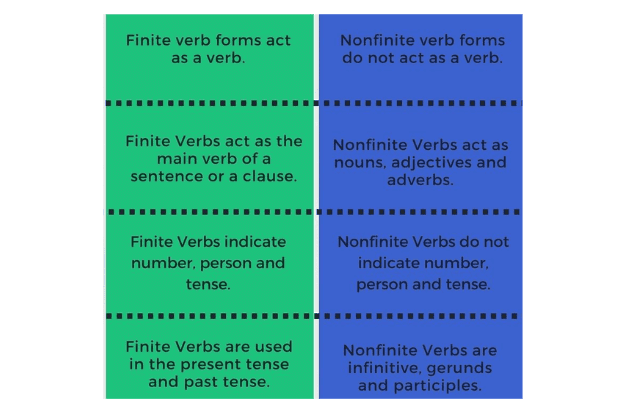Verb Class 6 Worksheet English Grammar
Instructions
- Read the chapter carefully before attempting this worksheet.
- All questions are compulsory.
- Each question carries 1 mark.

Section - A
Q1: Multiple Choice Questions
(i) Which of the following is a form of the verb 'to be'?
(a) am
(b) have
(c) do
(d) talk
Correct Answer is Option (a).
"Am" is a form of the verb "to be," which is used to describe the state of something or someone.
(ii) Which type of word shows an action or state?
(a) Noun
(b) Adjective
(c) Adverb
(d) Verb
Correct Answer is Option (d).
A verb is a word that shows an action (like "run") or a state of being (like "is").
(iii) Which of the following is an example of an irregular verb?
(a) play
(b) dance
(c) go
(d) walk
Correct Answer is Option (c).
"Go" is an irregular verb because its past tense form is "went," which does not follow the usual "-ed" ending rule.
(iv) Which of the following is an example of a finite verb?
(a) to speak
(b) speaking
(c) speaks
(d) spoke
Correct Answer is Option (c).
Speaks" is a finite verb because it shows tense and agrees with the subject in a sentence.
(v) Which of the following is an example of a non-finite verb?
(a) is
(b) are
(c) being
(d) was
Correct Answer is Option (c).
"Being" is a non-finite verb because it does not change according to the subject or tense of the sentence.
Section - B
Q2: Short Questions
(i) Define the term 'verb' in your own words.
A verb is a word that shows an action, occurrence, or state of being.
(ii) What are the three main types of verbs?
The three main types of verbs are action verbs, linking verbs, and helping verbs.
(iii) What is the difference between a finite and a non-finite verb?
Finite verbs have a definite tense and can stand alone in a sentence, while non-finite verbs do not have a definite tense and cannot stand alone.
(iv) Give an example of a special finite verb.
An example of a special finite verb is "can."
(v) Explain the difference between regular and irregular verbs.
Regular verbs follow a consistent pattern when changing tense, while irregular verbs do not follow a consistent pattern and must be memorized.
Section - C
Q3: Complete the sentences. Choose from the list and put the verb into the correct form. (i) Why are you so tired? Did you _______ to bed late last night?
(i) Why are you so tired? Did you _______ to bed late last night?
Why are you so tired? Did you go to bed late last night?
(ii) How is your new job? Are you _______ it?
How is your new job? Are you enjoying it?
(iii) How do you _______ this window? Can you show me?
How do you open this window? Can you show me?
(iv) I don’t _______ the problem. Can you explain it again?
I don’t understand the problem. Can you explain it again?
(v) I don’t know how to say this word. How is it _______?
I don’t know how to say this word. How is it pronounced?
(vi) I am going to take an umbrella with me. It is _______.
I am going to take an umbrella with me. It is raining.
(vii) Where are the chocolates? Have you _______ them all?
Where are the chocolates? Have you eaten them all?
(viii) My uncle’s car was badly _______ in the accident but I was OK.
My uncle’s car was badly damaged in the accident but I was OK.
(ix) Shalini is not at home. She has _______ away for a few days.
Shalini is not at home. She has gone away for a few days.
(x) Nikhil is in his room. He’s _______ to music.
Nikhil is in his room. He’s listening to music.

Q4: Put the verb into the correct form, to … or -ing:
(i) It was a nice day, so we decided _______ for a walk. (go)
It was a nice day, so we decided to go for a walk.
(ii) I’m not in a hurry. I don’t mind _______ (wait)
I’m not in a hurry. I don’t mind waiting.
(iii) I wish that dog would stop _______ It is driving me mad. (bark)
I wish that dog would stop barking It is driving me mad.
(iv) We were hungry, so I suggested _______ dinner early. (have)
We were hungry, so I suggested having dinner early.
(v) I’m still looking for a job but I hope _______ something soon. (find)
I’m still looking for a job but I hope to find something soon.
(vi) When I am tired, I enjoy _______ television. (watch)
When I am tired, I enjoy watching television.
(vii) It’s a nice day. Does anyone fancy _______ for a walk? (go)
It’s a nice day. Does anyone fancy going for a walk.
(viii) They don’t have much money. They can’t afford _______ out. (go)
They don’t have much money. They can’t afford to go out.
(ix) Our neighbour threatened _______ the police if we did not stop fighting. (call)
Our neigbour threatened to call the police if we did not stop fighting.
(x) Hurry up! I don’t want to risk _______ the train. (miss)
Hurry up! I don’t want to risk missing the train.
Q5: Put the verb in the right form:
(a) I ………….. my hands because they were dirty. (wash)
I washed my hands because they were dirty.
(b) Somebody has ………... this window pane. (break)
Somebody has broken this window pane.
(c) I feel good. I ……………… very well last night. (sleep)
I feel good. I slept very well last night.
(d) We ……………… a very good film yesterday. (see)
We saw a very good film yesterday.
(e) It ……………. a lot while we were on holiday. (rain)
It rained a lot while we were on holiday
(f) I have ………………. my bag. (lose). Have you ............ it? (see)
I have lost my bag. (lose). Have you seen it?
(g) Harish’s bicycle was ………….. last week. (steal)
Harish’s bicycle was stolen last week.
(h) I ………….. to bed early because I was tired. (go)
I went to bed early because I was tired.
(i) Have you …………….. your work yet? (finish)
Have you finished your work yet?
(j)This house was ……….. about 15 years ago. (build)
This house was built about 15 years ago.
|
49 videos|323 docs|46 tests
|
FAQs on Verb Class 6 Worksheet English Grammar
| 1. What are the eligibility criteria for the exam? |  |
| 2. How can I register for the exam? |  |
| 3. What is the exam pattern and syllabus? |  |
| 4. Are there any sample papers or practice tests available for the exam? |  |
| 5. How can I prepare effectively for the exam? |  |






















